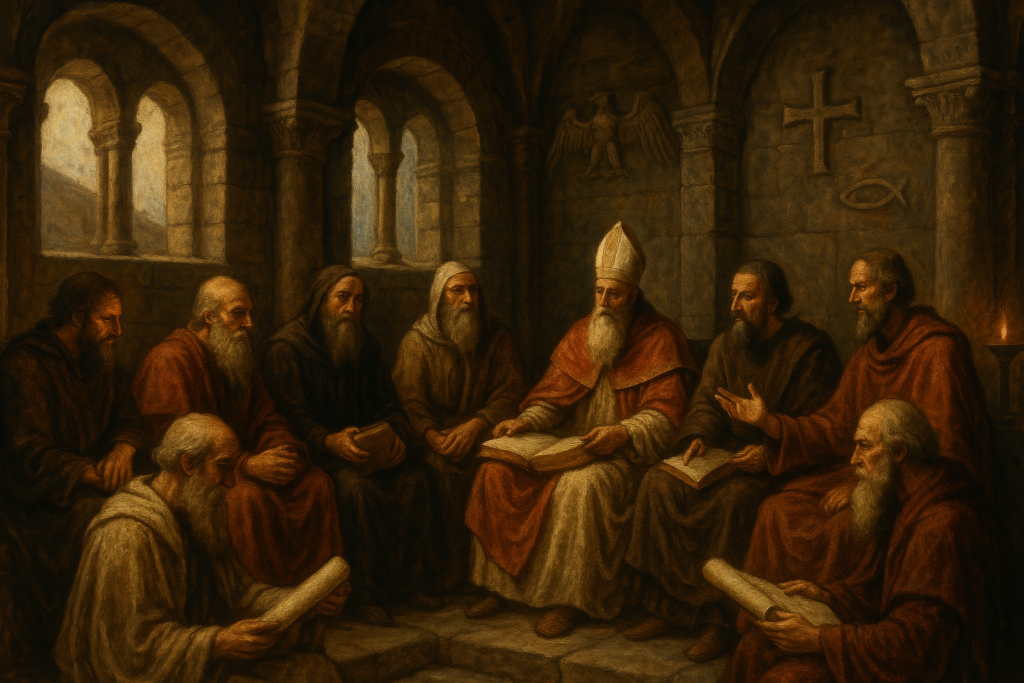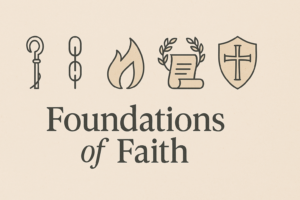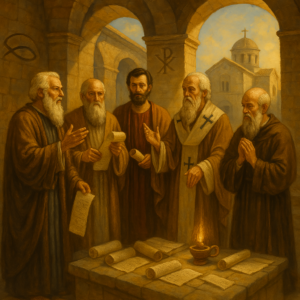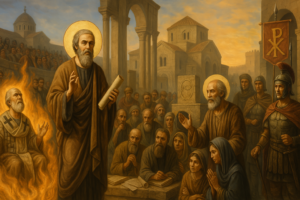
Estimated reading time: 15 minutes
Key Takeaways
- The Early Church Fathers were pivotal figures who shaped Christian doctrine and theology in the formative years of Christianity.
- Their writings and teachings continue to influence modern Christian faith and practice.
- They faced challenges such as persecution and heresies, prompting them to defend and clarify Christian beliefs.
- Key figures include Justin Martyr, Irenaeus, Ignatius of Antioch, Tertullian, Origen, and Augustine of Hippo.
- Their wisdom offers valuable insights that can transform contemporary understanding of faith.
Introduction: Early Church Fathers
The Early Church Fathers were prominent Christian thinkers and leaders who flourished during the first few centuries after Christ. These remarkable individuals significantly shaped Christian doctrine and theology during Christianity’s formative years. They weren’t simply religious figures—they were scholars, philosophers, and passionate defenders of the faith who navigated a complex world where Christianity was still defining itself.
These influential theologians played a vital role in guiding the development of Christian teachings and doctrines. During the crucial era of the first Church Councils, they helped establish the foundational beliefs that would define Christianity for centuries to come. Their thoughtful interpretations of Scripture and articulation of complex theological concepts provided clarity during a time when the church faced both internal disagreements and external threats.
What makes these ancient voices particularly significant is their enduring relevance. Their focus on writing and teaching continues to be of vital importance to Christian believers, theologians, and scholars today. These early Christian thinkers wrestled with questions about faith, morality, and human nature that remain remarkably relevant in our modern context.
Historical Context of the Early Church Fathers History
The Early Church Fathers emerged during a pivotal period in history spanning roughly from the late 1st century to the 8th century AD. This era began in the immediate aftermath of Jesus Christ’s ministry and the apostolic age, with the earliest fathers actually overlapping with some of the original apostles. This direct connection to apostolic teaching gave their writings special authority and significance.
The socio-political landscape these early Christian leaders navigated was incredibly challenging. Christianity developed within the Roman Empire, where it was initially viewed with suspicion and often faced outright persecution. Early believers were a minority religious group operating in a predominantly pagan society that found Christian practices and beliefs both strange and threatening. Roman authorities periodically launched campaigns against Christians, forcing the faith underground at times.
This hostile environment shaped the writings of the Early Church Fathers in profound ways:
- They needed to defend Christian beliefs against pagan criticisms.
- They worked to clarify theological concepts for new converts.
- They addressed ethical questions facing Christians living in a non-Christian society.
- They combated internal disagreements and emerging heretical movements.
The transition from the Apostolic Fathers to later church fathers marked an important development in Christian history. The Apostolic Fathers (such as Clement of Rome, Ignatius of Antioch, and Polycarp) were those who had personal connections with the original apostles. Their writings focused primarily on encouraging believers and maintaining apostolic teachings.
As Christianity spread and faced new challenges, later church fathers like Justin Martyr, Irenaeus, Tertullian, and Augustine developed more systematic theological approaches. They engaged with Greek philosophy, responded to complex heresies, and helped formulate the doctrinal positions that would shape Christian orthodoxy for centuries to come. This rich historical context underscores why studying the Early Church Fathers remains important for Christians today.
Key Figures Among the Apostolic Church Fathers
The term “Apostolic Fathers” refers specifically to those early church leaders who had direct personal contact with the twelve apostles of Jesus or their immediate disciples. These figures serve as crucial links between the apostolic age and the later development of Christianity. Their writings represent the earliest Christian literature outside the New Testament itself.
What makes the Apostolic Fathers particularly valuable is their temporal and personal proximity to the original apostles. Their teachings reflect the earliest interpretations and applications of apostolic doctrine. While later church fathers would develop more systematic theology, the Apostolic Fathers provide insights into the practical faith and worship of the very first Christian communities.
Let’s explore some of the most influential figures who shaped early Christianity:
St. Justin Martyr Writings
Justin Martyr (c. 100-165 AD) stands as one of Christianity’s first and most important apologists. Born into a pagan family, his spiritual journey led him through various philosophical schools before finding Christianity, which he described as “the only safe and profitable philosophy.”
His most significant works include:
- First Apology: Addressed to Emperor Antoninus Pius, this detailed defense of Christianity explained Christian practices and beliefs to skeptical Roman authorities. Justin carefully described early Christian worship services, including baptism and the Eucharist, providing invaluable insights into early church practices.
- Second Apology: A shorter work continuing his defense of Christianity against common Roman accusations.
- Dialogue with Trypho: A lengthy philosophical conversation with a Jewish scholar, demonstrating how Justin used reason to defend Christianity and interpret Old Testament prophecies as pointing to Christ.
Justin’s distinctive approach combined Greek philosophical concepts with Christian theology, pioneering an intellectual tradition that showed Christianity could engage with the best thinking of its day. He ultimately gave his life for his faith, being martyred in Rome around 165 AD, which is reflected in his title “Martyr.” Learn more about his contributions here.
Irenaeus Against Heresies
Irenaeus (c. 130-202 AD), Bishop of Lugdunum (modern Lyon, France), emerged as one of early Christianity’s most effective defenders against heretical teachings. As a student of Polycarp, who himself had been a disciple of the apostle John, Irenaeus represented a living link to apostolic teaching.
His masterwork, “Against Heresies” (Adversus Haereses), systematically dismantled Gnostic teachings that threatened the developing Christian orthodoxy. Gnosticism claimed to offer secret knowledge (gnosis) necessary for salvation and often rejected the material world as evil. Irenaeus’s counter-arguments were both thorough and influential:
- He emphasized the unity of God as creator of both the physical and spiritual realms, rejecting Gnostic dualism.
- He defended the full humanity and divinity of Christ against Gnostic claims that Christ only appeared human.
- He established the importance of apostolic succession for preserving authentic Christian teaching.
- He helped solidify the four gospels (Matthew, Mark, Luke, and John) as authoritative scripture.
Irenaeus’s writings provided a coherent theological framework that helped define orthodox Christianity against competing interpretations. His work established important principles for how Christians would interpret scripture and understand core doctrines for centuries to come. More details can be found here.
Ignatius of Antioch Writings
Ignatius of Antioch (c. 35-108 AD) served as the third bishop of Antioch in Syria and produced some of early Christianity’s most passionate and personal writings. What makes his letters particularly poignant is the context in which they were written—while being transported to Rome to face execution during the reign of Emperor Trajan.
On this journey to martyrdom, Ignatius composed seven authentic letters addressed to different Christian communities and to his fellow bishop Polycarp. These letters provide extraordinary insights into early Christian beliefs:
- Ecclesiology: Ignatius strongly emphasized church unity under the leadership of bishops. His famous statement, “Where the bishop appears, there let the people be, just as where Jesus Christ is, there is the Catholic Church,” reflects his view of proper church structure.
- Eucharistic theology: He affirmed the real presence of Christ in the Eucharist, calling it “the medicine of immortality.”
- Martyrdom: Ignatius welcomed his impending death, viewing it as the ultimate imitation of Christ’s sacrifice.
- Christology: He defended Christ’s dual nature (both human and divine) against early heretical views.
Ignatius’s writings show a church already developing organizational structures and sacramental understandings that would become central to Christian practice. His willingness to die for his faith also exemplified the devotion and conviction of early Christians despite facing severe persecution. Read more about his legacy here.
Tertullian and Origen
Tertullian (c. 155-220 AD) and Origen (c. 184-253 AD) represent two of the most brilliant and controversial minds of the early church, each leaving an indelible mark on Christian theology despite taking very different approaches.
Tertullian, a lawyer from Carthage in North Africa, brought his legal training to bear in crafting powerful defenses of Christianity. Often considered the first major Latin-speaking theologian, he:
- Coined crucial theological terms still used today, including “Trinity,” “person,” and “substance.”
- Authored his famous “Apology,” systematically refuting pagan accusations against Christians.
- Provided the classic statement, “The blood of martyrs is the seed of the Church.”
- Developed a rigorous moral theology that emphasized holy living and separation from pagan practices.
- Eventually joined the Montanist movement, promoting strict asceticism, creating tensions with mainstream Christianity.
Origen of Alexandria took a more philosophical approach, becoming the ancient church’s most prolific scholar and biblical commentator. His contributions included:
- Developing allegorical interpretation of Scripture that found deeper spiritual meanings beyond the literal text.
- Creating the Hexapla, a massive critical edition comparing different versions of the Old Testament.
- Writing “On First Principles,” one of Christianity’s earliest systematic theologies.
- Exploring controversial ideas about universal salvation and the pre-existence of souls.
- Suffering torture during the Decian persecution but remaining steadfast in his faith.
Both figures generated controversy—Tertullian for his eventual Montanist leanings and Origen for some speculative theological positions later deemed problematic. Yet their intellectual contributions proved invaluable for Christianity’s development, demonstrating how faith could engage with both legal reasoning and philosophical thought. Discover more about these scholars here.
Augustine of Hippo
Augustine of Hippo (354-430 AD) stands as perhaps the most influential theologian in Western Christianity, whose impact extends far beyond his own time. Born in North Africa to a pagan father and Christian mother (Monica), his personal journey from a life of intellectual searching and moral struggle to profound faith is documented in his famous “Confessions,” one of the world’s first spiritual autobiographies.
Augustine’s impact on Christian doctrine was immense and multifaceted:
- Original Sin: He developed the understanding that humanity inherits a sinful nature from Adam, making salvation entirely dependent on God’s grace rather than human merit.
- Divine Grace: Augustine emphasized that salvation comes solely through God’s unmerited favor, not through human works or effort.
- Predestination: He taught that God sovereignly chooses those who will be saved, influencing later Reformed theology.
- The City of God: Written after Rome’s fall to barbarians in 410 AD, this masterwork contrasted the earthly city (human society) with the heavenly city (God’s kingdom), providing a Christian philosophy of history and politics.
- Trinity: Augustine offered sophisticated explanations of how God could be three persons in one essence, using psychological analogies from human experience.
Augustine’s prolific writings addressed virtually every aspect of Christian theology and practice. His ability to synthesize biblical teaching with philosophical reasoning created a theological framework that dominated Western Christianity throughout the medieval period. His ideas continue to be debated and applied by theologians across denominational lines today. Learn more from this source.
Apostolic Fathers Writings
The writings of the Apostolic Fathers provide our earliest window into Christianity after the New Testament era. These texts, while not considered scripture, hold special importance because they come from authors who either knew the apostles personally or were just one generation removed from them. Their works reveal how the earliest Christians understood and applied apostolic teachings.
Key texts from this period include:
- First Epistle of Clement (c. 95-96 AD): Written by Clement of Rome to the church at Corinth, addressing a leadership dispute and emphasizing proper church order and unity.
- The Didache (c. 50-120 AD): Also called “The Teaching of the Twelve Apostles,” this church manual provides practical instruction on Christian ethics, baptism, prayer, fasting, the Eucharist, and discerning true prophets.
- Letters of Ignatius: Seven letters written during Ignatius’s journey to martyrdom, emphasizing church unity and the authority of bishops.
- The Shepherd of Hermas: An apocalyptic work containing visions, mandates, and parables focused on repentance and moral living.
- Epistle of Polycarp to the Philippians: Written by the bishop of Smyrna, exhorting believers to righteous living and warning against false teaching.
<br
These writings reveal several important aspects of early Christian faith:
- The centrality of Jesus Christ in worship and teaching.
- The importance of moral conduct and holy living.
- Developing structures of church leadership and authority.
- Continued use of Old Testament scriptures alongside emerging New Testament writings.
- Regular celebration of baptism and the Eucharist.
- Expectation of Christ’s return.
The Apostolic Fathers’ writings serve as a bridge between the apostolic age and later church developments, showing both continuity with New Testament teachings and the beginning of theological formulations that would be expounded by later generations. More information can be found here.
Early Christian Writings
The corpus of early Christian writings beyond the Apostolic Fathers represents an astonishingly diverse and rich theological treasury. As Christianity spread throughout the Roman Empire and beyond, Christian authors produced works in multiple languages addressing the intellectual, spiritual, and practical challenges facing the growing church.
These writings took many forms:
- Apologetic works defending Christianity against pagan, Jewish, and heretical critics.
- Biblical commentaries interpreting scripture for Christian communities.
- Theological treatises exploring complex doctrinal questions.
- Homilies and sermons expounding scripture for ordinary believers.
- Letters addressing specific communities or individuals about practical matters.
- Liturgical texts guiding worship and sacramental practices.
- Historical accounts documenting persecutions, councils, and significant events.
- Spiritual writings providing guidance for prayer and holiness.
These texts provide an invaluable window into how Christianity developed from a small Jewish sect into a diverse, sophisticated religious tradition that would fundamentally reshape Western civilization. They demonstrate both remarkable consistency in core beliefs and considerable diversity in theological expression and emphasis. Learn more here.
Catholic Church Fathers Writings
The writings of the Church Fathers hold a special place in Catholic tradition, where they are considered a vital source of doctrine and practice alongside Scripture and the Magisterium (teaching authority). These works significantly influenced distinctive Catholic doctrines and practices that continue to define the Church today.
Several key areas where the Catholic Church Fathers’ writings proved particularly influential include:
- Sacramental Theology: Early fathers like Cyril of Jerusalem and Ambrose of Milan developed rich understandings of baptism, Eucharist, and other sacraments as vehicles of divine grace.
- Marian Doctrines: Church fathers began developing the theological foundation for Catholic devotion to Mary, laying groundwork for later doctrines.
- Ecclesiology and Papal Authority: Writings from Ignatius of Antioch and Cyprian of Carthage emphasized church unity under episcopal leadership, claiming special authority for the Roman See.
- Monasticism and Asceticism: Fathers like John Cassian and Basil the Great established theological frameworks for monastic life and ascetic disciplines.
- Sacred Tradition: Irenaeus and Tertullian articulated the concept that apostolic teaching was preserved not only in Scripture but also in the ongoing tradition of the Church.
These patristic writings continue to be extensively studied in Catholic seminaries and universities. The Catholic approach to these writings emphasizes their collective witness as part of an unbroken tradition. Find out more here.
Early Church Fathers Commentary on Scripture
The Early Church Fathers pioneered biblical interpretation methods that continue to influence how Christians understand scripture today. Their commentaries reveal a sophisticated approach to biblical texts that sought to uncover multiple layers of meaning while remaining faithful to apostolic teaching.
Several distinctive features characterized the Fathers’ approach to scripture:
- Christocentric Reading: They consistently interpreted the Old Testament through the lens of Christ’s life, death, and resurrection.
- Multiple Senses of Scripture: Identifying several levels of meaning in biblical texts—literal, allegorical, moral, and anagogical.
- Rule of Faith: Emphasizing that scripture should be interpreted within the context of the Church’s received apostolic teaching.
- Holistic Reading: Reading the Bible as a unified whole rather than isolated passages.
The Fathers’ commentaries demonstrate remarkable theological creativity coupled with deep reverence for sacred text. They modeled an approach to scripture that was simultaneously intellectual and devotional, academic and pastoral—seeking both understanding and transformation through engagement with God’s word. More insights can be found here.
Teachings of the Early Church Fathers
The theological principles advocated by the Early Church Fathers established the foundation of Christian doctrine that has endured for two millennia. Their teachings addressed the most fundamental questions about God, humanity, salvation, and the church, providing answers that continue to define orthodox Christianity across its many branches.
The Nature of God
The Fathers articulated a sophisticated understanding of God that balanced divine unity with Trinitarian diversity. They affirmed monotheism while explaining how Father, Son, and Holy Spirit share one divine essence.



